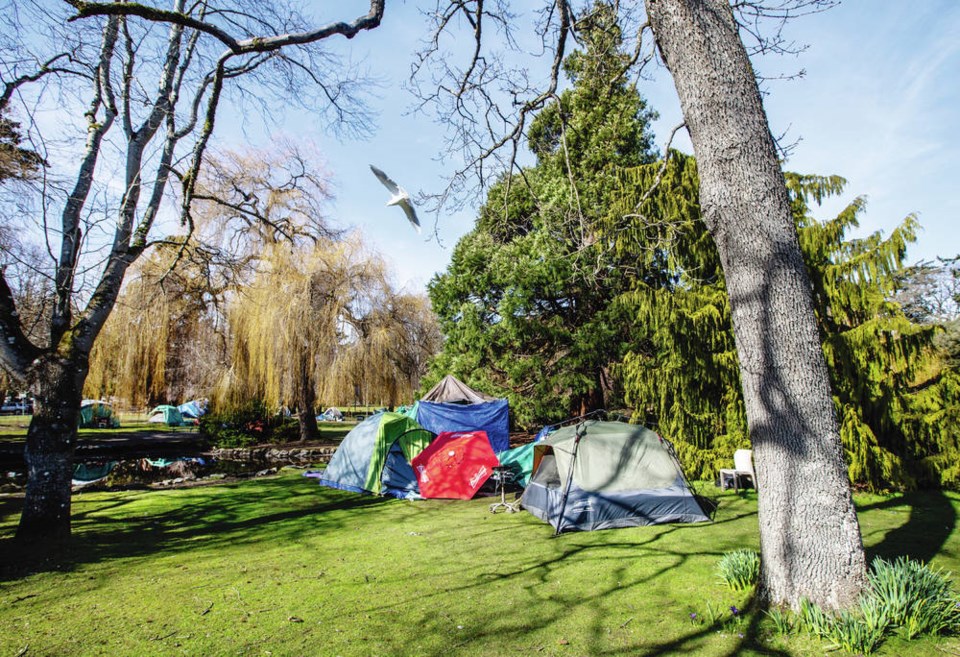The province and city say everyone living in encampments in Victoria parks will be offered an indoor space by the end of April — one month later than planned.
B.C. Housing estimates more than 200 people are living in encampments in Victoria. A total of 224 spaces and 50 rental supplements to help people move out of supportive housing — freeing up 50 more spaces — have been secured through a partnership between the city, the province and B.C. Housing, said Laura McLeod, a spokeswoman for B.C. Housing.
The city had set a deadline to offer housing to everyone by the end of March, but because two new sites providing 70 spaces will require significant retrofitting, the process to move people indoors will continue to the end of April.
Locations of the two new shelters have not been released, but the province said they are not in the Burnside Gorge neighbourhood, where residents have complained of a disproportionate number of supportive housing sites in the area.
Once everyone living in encampments has been offered an indoor space, the city will return to prohibiting around-the-clock sheltering in parks, Mayor Lisa Helps said.
Victoria council gave three readings Thursday evening to bylaw changes that will end all-day camping as of May 1. The vote was 7-2 in favour with adoption set for next week, though some councillors expressed a desire to see all the housing in place before making a final decision.
Once the changes come into effect, Helps said that if people are still camping outdoors after the deadline, they will be required to pack up their belongings by 7 each morning.
“Parks are not homes,” she said. “Beacon Hill Park is not a campground. It is a temporary sheltering situation in an emergency, and so after May 1, we’re going to do the same thing we did pre-pandemic, which is enforce the bylaw.”
David Eby, attorney general and minister responsible for housing, said he’s confident the deadline won’t be further delayed, and the number of spaces will be sufficient. The province was looking for sites that were ready to be used as housing, like hotels, but wasn’t willing to pay above market value, Eby said.
The two new buildings are bare spaces that will require cubicles, similar to the set-up in Save-on-Foods Memorial Centre, he said. The arena shelter space, which reopened last week, has 47 single beds, each with two walls, a bedside table and a locker. The site originally opened with 45 beds, but space was found for two more, B.C. Housing said.
Eby said a “significant number” of people and organizations worked together to find the spaces.
He said 57 people previously living in encampments have already moved indoors, including 47 at the arena. “People are going to see steady progress from now until the end of April, as more and more people are moved inside,” he said.
B.C. Housing’s current lease with the arena ends May 31, with an option to extend, but the site is booked for a Tokyo Olympics basketball qualifying tournament in June. It’s unclear if the event will go ahead, but if B.C. Housing is unable to extend the lease, it will find temporary or permanent shelter for the people living there, McLeod said.
Island Health staff visited the arena shelter last week to administer COVID-19 vaccines to anyone who wanted one.
The new shelters will be welcome news for some living in parks, but many will be disappointed by an offer to move into another temporary shelter, said Rachel Phillips, executive director of PEERS Victoria Resources Society, which provides outreach and harm reduction for sex workers.
Those living at a camp in the parking lot near Royal Athletic Park, where PEERS operates a warming tent, were led to believe they’d be moving to permanent housing, she said.
“That’s hard for people, because that’s not what people hoped for, or are looking for, in lots of cases. And I know that B.C. Housing has tried. That’s not what they wanted, either,” she said.
Living in large, shared shelter spaces can be difficult for many people, including those with social anxiety, older people, those who have been incarcerated and Indigenous people who survived residential schools, Phillips said.
“If we truly want to end homelessness, we need to do better in what we’re able to offer to people,” she said.
Besides the 70 new shelter spaces and 47 beds at Save-on-Foods Memorial Centre, the 224 spaces include five in a youth hostel, 52 in the Capital City Center hotel, 30 in tiny homes to be installed near Royal Athletic Park and 20 vacancies in existing supportive housing.
All locations are expected to be operational by April 30, with staff on site around-the-clock to provide supports such as meal programs, life-skills training and health-and-wellness support services.
Victoria council asked staff Thursday to report back on ways to better manage the numbers of people living in their vehicles in parks and other areas.
The move comes after a man died in a van fire in Beacon Hill Park on March 4.
A recent count found 27 people sleeping in vehicles in the park, but staff say there are likely many more across the city.



